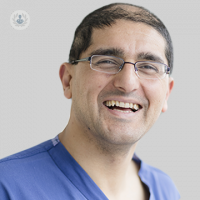When should I visit a cough specialist?
Written in association with:Most people with a chronic cough will visit their GP for advice and treatment. But evidence suggests that a visit to a cough specialist is much more likely to result in correct diagnosis and effective treatment. So what does a cough specialist do, how do they diagnose your cough, and when should you visit one? We asked Dr Sundeep Kaul, leading expert in both respiratory medicine and critical care.

What is a cough specialist?
A cough specialist is someone who has particular experience in managing patients with chronic cough.
We offer a systematic approach to managing chronic cough, covering your history, a medical examination, investigations then treatment. Over many years, specialists in chronic cough have developed a complex decision-making process to get to the bottom of the issue and ensure nothing is missed. Think of us as detectives – our role is to ask the right questions, follow promising leads, and shine a light (sometimes literally) on problems that need clarifying.
Ultimately, a systematic approach to diagnosis and treatment remains the most effective way to manage chronic and persistent cough.
What exactly do you do?
Symptoms and medical history
We start by asking important questions about your symptoms and medical history. This can tell us many useful things:
- If the cough came on suddenly, this could suggest that there’s something stuck in your lungs.
- If you cough up sputum, this usually indicates a problem with your lungs and we’ll investigate that further.
- If your cough wakes you up at night, this could indicate asthma.
- If your cough happens when you eat, drink or change posture we might suspect gastric reflux disease.
- If you smoke, we’ll recommend you stop or reducing your smoking, as this significantly improves symptoms.
Next we would ask you about any medications you take, as ACE inhibitors are known to be associated with a sensitive cough reflex.
Finally, we’d ask you in detail about your occupation and hobbies, to see if there is anything in the air you breathe that is triggering the cough.
Examination
A physical examination should always complement a medical history. There are three main examinations that we can carry out:
- An examination of your lungs can reveal signs of asthma, infection, lung cancer, pulmonary fibrosis or heart failure.
- An ear, nose and throat (ENT) exam can reveal rhinitis, pharyngitis and tonsillitis.
- An examination of the larynx may reveal gastric reflux disease and or vocal cord issues.
Investigations
Imaging of the chest is absolutely mandatory. We’ll start with a chest X-ray but may carry out a CT scan even if the X-ray is normal. As well as the chest, we’ll image the sinuses, since sinus problems are one of the leading causes of a chronic cough. We may also image the heart (echo).
We’ll test your lung function using a spirometry test. If this proves inconclusive, we have more advanced tests available, such as bronchial provocation, to help pinpoint the issue.
What happens next?
The treatment we offer depends on the diagnosis. Sometimes we might refer you to the relevant specialist – such as an ENT surgeon in the case of sinus problems, or a gastroenterologist for reflux disease. We’ll provide them with the results of all of the tests we’ve done so that they’re in the best position to treat your condition effectively.ow
In many cases, however, we’ll begin treatment while we’re still investigating, as this will improve symptoms in a lot of patients. It also helps us to see if we’re on the right lines with our investigation.
What kind of patients do you treat?
Many patients come to cough specialists for a second medical opinion. They seek specialist advice because despite having already received treatment for their cough, it either hasn’t worked or it has come back.
However, anyone with a cough – whether chronic or acute – can visit. If you have a chronic cough – i.e. a cough which has lasted for more than eight weeks – it’s important to get it investigated.


